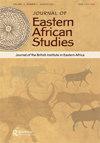Humanitarian spill-over: the expansion of hybrid humanitarian governance from camps to refugee hosting societies in East Africa
IF 0.6
3区 社会学
Q2 AREA STUDIES
引用次数: 7
Abstract
ABSTRACT The impact and effects of protracted refugee camps on their host environments in East Africa has been the subject of much academic attention since the late 1990s. Such camps are often viewed as exclusionary spaces that isolate refugees from their host societies. Recent analyses, however, posit such camps as hybrid spaces, with fluid boundaries, that provide socio-economic opportunities and are potential drivers of development. Less thinking has gone into how forms of (humanitarian) governance emanate from such camps and impact their host environments. This paper is based on ethnographic research in and around refugee camps in Kenya and Tanzania. Grounded in a spatial analysis of camp development processes, this paper explores the notion of ‘humanitarian spill-over’. It argues that camps’ specific governmental processes and bureaucratic power come to co-govern and co-shape socio-spatial relations beyond the boundaries of the camp and the initial targets of humanitarian concern. By analysing the socio-spatial effects of long-term humanitarian governance, this paper contributes to, debates about camps as hybrid spaces and locates experiments with developmental approaches to camp environments in East Africa in a history of a more organic process of spill-over. We show how the spill-over is increasingly posited as intention rather than effect.人道主义溢出效应:混合人道主义治理从难民营扩展到东非的难民收容社会
摘要自20世纪90年代末以来,东非旷日持久的难民营对收容环境的影响一直是学术界关注的主题。这些难民营往往被视为排斥性空间,将难民与其所在社会隔离开来。然而,最近的分析认为,这些营地是具有流动边界的混合空间,提供了社会经济机会,是发展的潜在驱动力。很少有人思考(人道主义)治理形式是如何从这些营地产生并影响其所在环境的。本文基于对肯尼亚和坦桑尼亚难民营及其周围地区的民族志研究。基于对营地发展过程的空间分析,本文探讨了“人道主义溢出”的概念。它认为,难民营的具体政府程序和官僚权力超越了难民营和人道主义关注的最初目标的边界,共同治理和塑造了社会空间关系。通过分析长期人道主义治理的社会空间影响,本文为关于营地作为混合空间的辩论做出了贡献,并在一个更有机的溢出过程的历史中,定位了东非营地环境发展方法的实验。我们展示了溢出如何越来越多地被认为是意图而非效果。
本文章由计算机程序翻译,如有差异,请以英文原文为准。
求助全文
约1分钟内获得全文
求助全文
来源期刊

Journal of Eastern African Studies
AREA STUDIES-
CiteScore
3.30
自引率
7.10%
发文量
12
期刊介绍:
Journal of Eastern African Studies is an international publication of the British Institute in Eastern Africa, published four times each year. It aims to promote fresh scholarly enquiry on the region from within the humanities and the social sciences, and to encourage work that communicates across disciplinary boundaries. It seeks to foster inter-disciplinary analysis, strong comparative perspectives, and research employing the most significant theoretical or methodological approaches for the region.
 求助内容:
求助内容: 应助结果提醒方式:
应助结果提醒方式:


